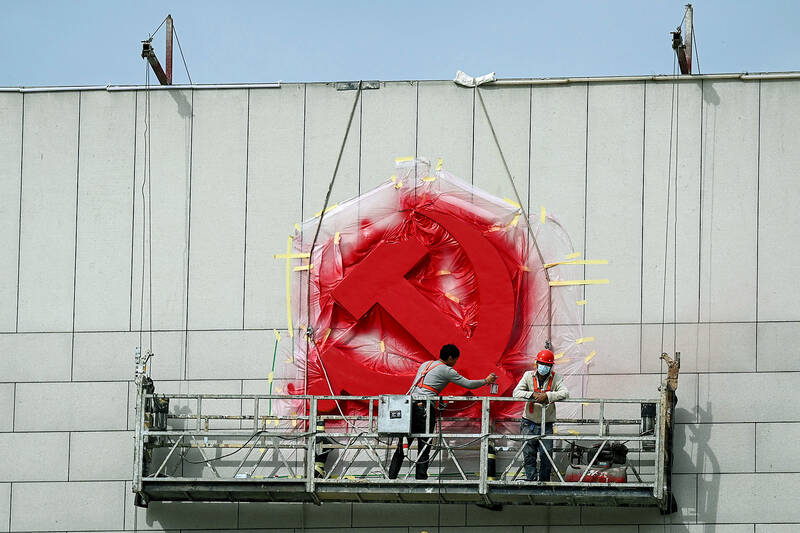China today launches a twice-a-decade party conference at which Chinese President Xi Jinping (習近平) is expected to receive a third five-year term that breaks with recent precedent and establishes himself as arguably the most powerful Chinese politician since Mao Zedong (毛澤東).
Xi is expected to issue a lengthy address at the opening session, but little change is foreseen in his formula of strict one-party rule, intolerance of criticism and a hard-line approach toward COVID-19, including quarantines and travel bans even as other countries have opened up.
As with most Chinese political events, little information has been released beforehand and the outcome of the National Congress of the Chinese Communist Party (CCP) is only to be announced after several days of closed-door sessions.

Photo: AFP
At a two-hour news conference yesterday, the congress’ spokesperson Sun Yeli (孫業禮) reaffirmed the government’s commitment to its “zero COVID” policy, despite the economic costs, and repeated its threat to use force to annex Taiwan.
China reserves the right to use force over Taiwan as a last resort in compelling circumstances, though peaceful reunification is its first choice, Sun said.
However, he said China would not tolerate what he called a movement toward full independence supported by hardliners and their overseas backers.

Photo: Reuters
Sun offered few details about what if any changes would be enacted to the party’s charter at the meeting, which is expected to last about a week.
The congress is the 20th in the history of the century-old party, which boasts about 96 million members, more than 2,000 of whom are to attend the Beijing meetings.
The changes would “incorporate the major theoretical views and strategic thinking” concluded in the five years since the last congress, said Sun, a deputy head of the CCP’s Propaganda Department who is not well known outside party circles.
The amendment or amendments would “meet new requirements for advancing the party’s development and work in the face of new circumstances and new tasks,” Sun said.
Xi has left little room for further political aggrandizement, having placed himself thoroughly in charge of domestic affairs, foreign policy, the military, the economy and most other key matters overseen by party working groups that he leads.
The congress comes as China’s economy is facing major headwinds amid a near-collapse in the real estate sector and the toll on retail and manufacturing imposed by COVID-19 restrictions that upped the regime’s already intense monitoring of the population and suppression of free speech.
Sun offered no hope that China would be backing away from the “zero COVID” policy, which Xi and other leaders have made a political issue despite criticism by the WHO and others that it is not a practical long-term solution given improvements in vaccines and therapies.

The Central Election Commission has amended election and recall regulations to require elected office candidates to provide proof that they have no Chinese citizenship, a Cabinet report said. The commission on Oct. 29 last year revised the Measures for the Permission of Family-based Residence, Long-term Residence and Settlement of People from the Mainland Area in the Taiwan Area (大陸地區人民在台灣地區依親居留長期居留或定居許可辦法), the Executive Yuan said in a report it submitted to the legislature for review. The revision requires Chinese citizens applying for permanent residency to submit notarial documents showing that they have lost their Chinese household record and have renounced — or have never

A magnitude 5.6 earthquake struck off the coast of Yilan County at 12:37pm today, with clear shaking felt across much of northern Taiwan. There were no immediate reports of damage. The epicenter of the quake was 16.9km east-southeast of Yilan County Hall offshore at a depth of 66.8km, Central Weather Administration (CWA) data showed. The maximum intensity registered at a 4 in Yilan County’s Nanao Township (南澳) on Taiwan’s seven-tier scale. Other parts of Yilan, as well as certain areas of Hualien County, Taipei, New Taipei City, Taoyuan, Hsinchu County, Taichung and Miaoli County, recorded intensities of 3. Residents of Yilan County and Taipei received

Taiwan has secured another breakthrough in fruit exports, with jujubes, dragon fruit and lychees approved for shipment to the EU, the Ministry of Agriculture said yesterday. The Animal and Plant Health Inspection Agency on Thursday received formal notification of the approval from the EU, the ministry said, adding that the decision was expected to expand Taiwanese fruit producers’ access to high-end European markets. Taiwan exported 126 tonnes of lychees last year, valued at US$1.48 million, with Japan accounting for 102 tonnes. Other export destinations included New Zealand, Hong Kong, the US and Australia, ministry data showed. Jujube exports totaled 103 tonnes, valued at

BIG SPENDERS: Foreign investors bought the most Taiwan equities since 2005, signaling confidence that an AI boom would continue to benefit chipmakers Taiwan Semiconductor Manufacturing Co’s (TSMC, 台積電) market capitalization swelled to US$2 trillion for the first time following a 4.25 percent rally in its American depositary receipts (ADR) overnight, putting the world’s biggest contract chipmaker sixth on the list of the world’s biggest companies by market capitalization, just behind Amazon.com Inc. The site CompaniesMarketcap.com ranked TSMC ahead of Saudi Aramco and Meta Platforms Inc. The Taiwanese company’s ADRs on Tuesday surged to US$385.75 on the New York Stock Exchange, as strong demand for artificial intelligence (AI) applications led to chip supply constraints and boost revenue growth to record-breaking levels. Each TSMC ADR represents